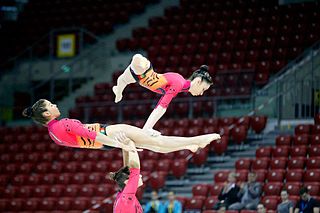
Gymnastics is a type of sport that includes physical exercises requiring balance, strength, flexibility, agility, coordination, artistry and endurance. The movements involved in gymnastics contribute to the development of the arms, legs, shoulders, back, chest, and abdominal muscle groups. Gymnastics evolved from exercises used by the ancient Greeks that included skills for mounting and dismounting a horse, and from circus performance skills.

Rhythmic gymnastics is a sport in which gymnasts perform on a floor with an apparatus: hoop, ball, clubs, ribbon and rope. The sport combines elements of gymnastics, dance and calisthenics; gymnasts must be strong, flexible, agile, dexterous and coordinated. Rhythmic gymnastics is governed by the International Gymnastics Federation (FiG), which first recognized it as a sport in 1963. It became an Olympic sport in 1984, with an individual all-around event. The group all-around competition was added to the Olympics in 1996. At the international level, rhythmic gymnastics is a women-only sport. The most prestigious competitions, besides the Olympic Games, are the World Championships, World Games, European Championships, European Games, the World Cup Series and the Grand Prix Series. Gymnasts are judged on their artistry, execution of skills, and difficulty of skills, for which they gain points. They perform leaps, balances, and rotations along with handling the apparatus.
Artistic gymnastics is a discipline of gymnastics in which athletes perform short routines on different apparatuses. The sport is governed by the Fédération Internationale de Gymnastique (FIG), which assigns the Code of Points used to score performances and regulates all aspects of elite international competition. Within individual countries, gymnastics is regulated by national federations such as British Gymnastics and USA Gymnastics. Artistic gymnastics is a popular spectator sport at many competitions, including the Summer Olympic Games.

Acrobatic gymnastics is a competitive discipline of gymnastics where partnerships of gymnasts work together and perform figures consisting of acrobatic moves, dance and tumbling, set to music. There are three types of routines; a 'balance' routine where the focus is on strength, poise and flexibility; a 'dynamic' routine which includes throws, somersaults and catches, and a 'combined' routine which includes elements from both balance and dynamic.
The Artistic Gymnastics World Championships are the world championships for artistic gymnastics governed by the Fédération Internationale de Gymnastique (FIG). The first edition of the championships was held in 1903, exclusively for male gymnasts. Since the tenth edition of the tournament, in 1934, women's events are held together with men's events.
The European Men's Artistic Gymnastics Championships are an annual series of artistic gymnastics championships for male gymnasts from European countries organised by the European Union of Gymnastics. They take place in two biennial formats; in even years they take place in tandem with a junior men's competition, and historically have included a team event, but not an individual all-around. In odd years, they are held in tandem with the European Women's Artistic Gymnastics Championships, and include a team competition. These events are sometimes called the European Individual Artistic Gymnastics Championships. Despite the alternating formats, all winners are considered European champions with one medal table.
The European Women's Gymnastics Championships are an artistic championships for female gymnasts from European countries organised by the European Union of Gymnastics. They are held annually, though rotate between two different formats.
The men's individual all-around at the European Men's Artistic Gymnastics Championships have been staged since 1955.
The European Women's Artistic Gymnastics Championships were first held in 1957.
The vault event at the European Women's Artistic Gymnastics Championships was first held in 1957.
The uneven bars at the European Women's Artistic Gymnastics Championships were first held in 1957.
The floor event at the European Women's Artistic Gymnastics Championships was first held in 1957.
The balance beam event at the European Women's Artistic Gymnastics Championships was first held in 1957.
The 1st Individual European Artistic Gymnastics Championships were held in Debrecen, Hungary, on 2 June to 5 June 2005. It included both men's and women's events.

Claudia Fragapane is a retired British artistic gymnast. She came to prominence at the 2014 Commonwealth Games, where she was the first English woman to win four gold medals in a single Games since 1930. In 2015, Fragapane was part of the women's gymnastics team that won Great Britain's first-ever team medal, a bronze, at the World Artistic Gymnastics Championships, before winning an individual world championship bronze on floor two years later.

The 7th European Men's and Women's Artistic Gymnastics Individual Championships were held from 19 to 23 April 2017 at the Polyvalent Hall in Cluj-Napoca, Romania. As usual in this format, no team competitions took place.
Men's pommel horse has been staged at every European Men's Artistic Gymnastics Championships since 1955.
Men's rings has been staged at every European Men's Artistic Gymnastics Championships since 1955.
Men's vault has been staged at every European Men's Artistic Gymnastics Championships since 1955.
Men's parallel bars has been staged at every European Men's Artistic Gymnastics Championships since 1955.




